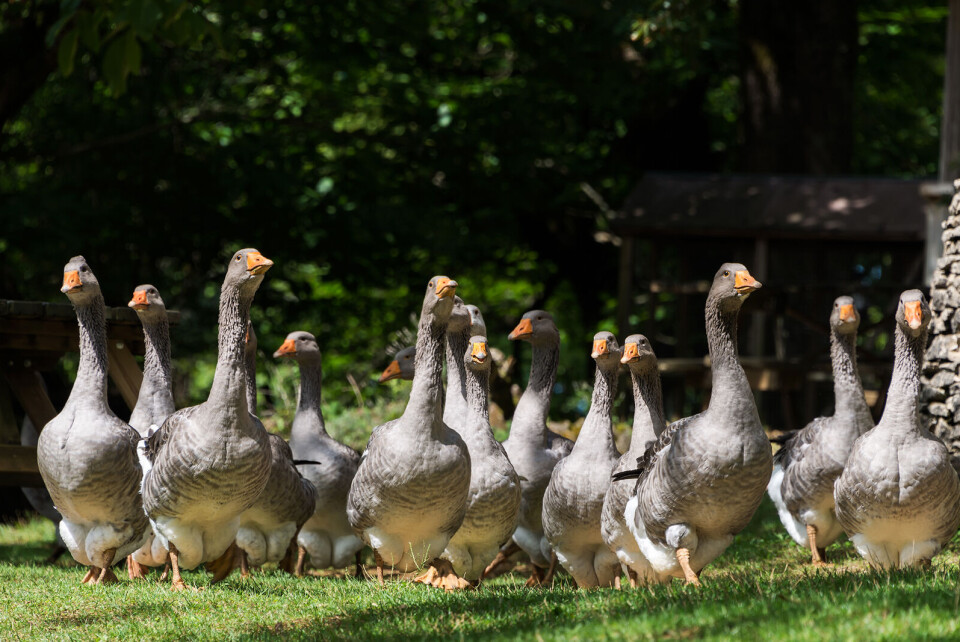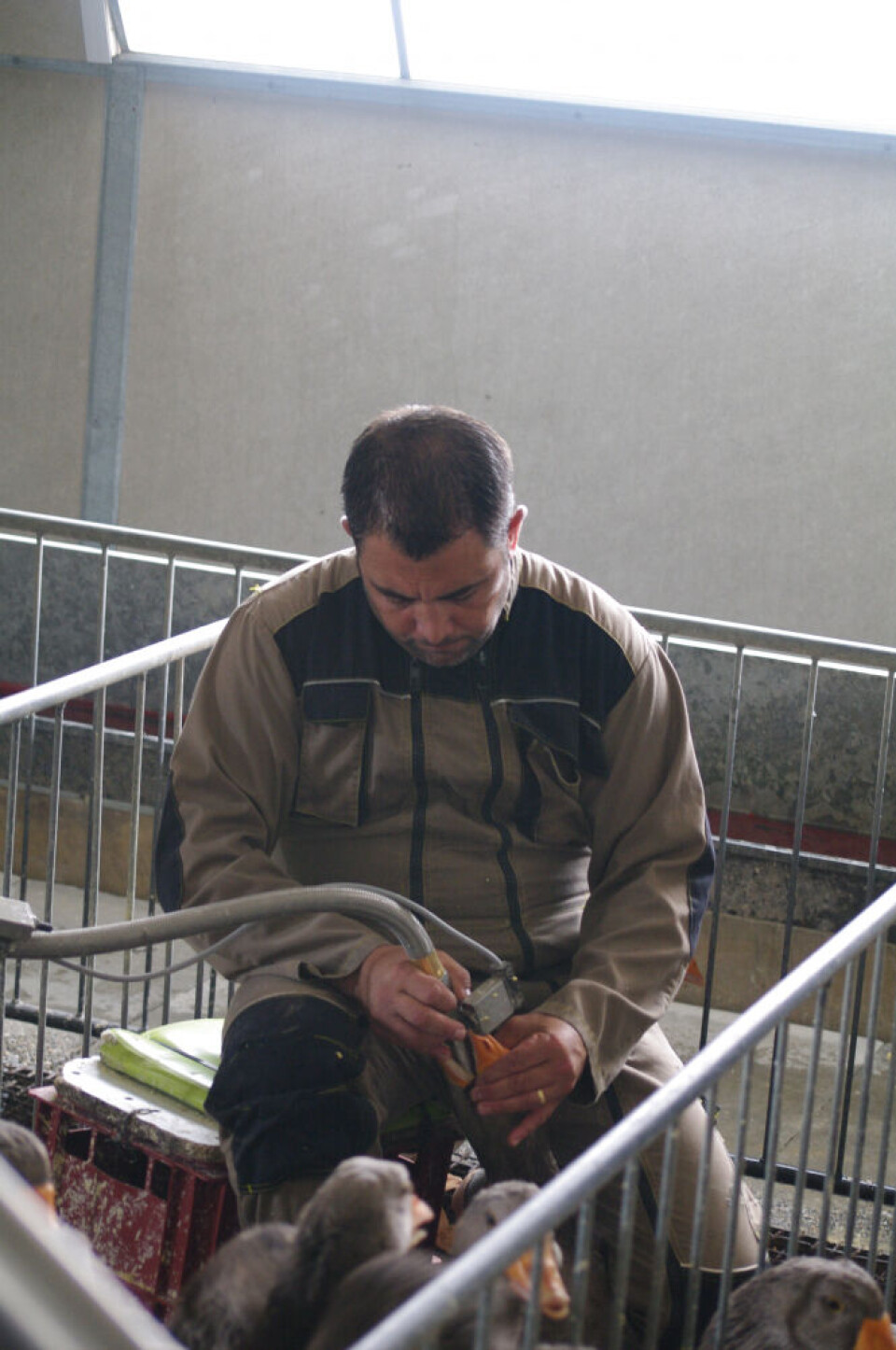-
New farmer protests this week - where and what to expect
Pressure mounts on the government over agricultural policy, disease control and trade agreements
-
French farmers begin major protest in Strasbourg
More than 700 tractors expected to park outside EU Parliament in two-day protest
-
French farmer protests: action expected around Lyon and in Poitiers but quieter elsewhere
Some unions continue to demonstrate despite ‘emergency law’ proposal
French producer: ‘Foie gras can only be made if you love geese’
There are few foie gras producers in France where everything is done on the farm. Florian Boucherie runs ferme auberge La Garrigue Haute in Dordogne

There are few foie gras producers in France where everything, from raising chicks through to selling the finished product, is done on the farm.
Most foie gras comes instead from large agricultural co-operatives. Raising birds, fattening them, and making the foie gras is all done in different stages over various sites.
Florian Boucherie, 40, is one of the 15% of independent producers who fall into the first category. He runs ferme auberge La Garrigue Haute in Dordogne with his parents, Joëlle and Daniel.

“It has become very fashionable to talk of short circuits, where food is sold and consumed where it is grown, but we have been doing it for years,” he said. “I became manager of the family business in 2012, and it was something my parents had already started, and which we have since focused on.”
He is the seventh generation to work the farm in Prats-de- Carlux. When his grandparents took it over in the 1950s, it was mainly dairy and tobacco, with geese and ducks a sideline, and foie gras mostly produced to be eaten by the family.
By the time his parents took over in 1982, the farm specialised in raising ducks and geese, and began selling foie gras and conserves at local markets.
“We converted an old barn into a chambres d’hôtes, which quickly became a ferme auberge with a restaurant. Meals were made from our own produce, and we also started to sell more of it directly,” Florian said.
“It was a realisation that we produce exceptionally good products and could market them ourselves, instead of sending them through lots of different middlemen, who all take their percentage.”
Now the 25-hectare farm produces all the foie gras, magrets and other conserves cooked at the restaurant, as well as selling through a website and at markets in nearby Sarlat and Brive.
For foie gras, the birds are spread over six hectares and the farm produces two lots of 200 geese a year, followed by two lots of 600 ducks. They live outside for three to four months before starting the force-feeding fattening regime (known as gavage), lasting up to two weeks. During that time, they have a mix of maize and flour, all produced on the farm, pumped into their stomachs, three times a day for the geese and twice a day for the ducks.
Florian, or a colleague, uses a €28,000 machine to do so. The amount fed increases from 400g to 550g over that period.
As part of the Journées du Patrimoine initiative, he opened the farm to journalists and visitors to show how it was done, grabbing geese kept in pens of 20 by the neck and pinning them with his knee to allow him to extend the neck and put in the feeder.
After the feed, which lasted around two seconds per bird, they looked a bit astonished, but not unhappy. Some even tried to smuggle themselves back into the side of the pen where birds were waiting to be fed to get a double dose.
François Landais, a consultant vet for the foie gras trade body Cifog, explained the feeding tubes are designed not to hurt the birds, which do not have a glottis like humans and whose throats are elastic enough to swallow whole fish.
“The digestive system has been designed to cope with gluts of food, particularly as they put on weight and fat before a migration,” he said.
'It is very rare that birds are hurt during forced feedings'
Experiments have shown that once force-feeding stops, livers return to the size they were before within 40 days.
Florian said the job can only be done by people who like geese and ducks.
“There is no fixed schedule for the feeding – we do not feed when it is too hot, for example, and you have to wait for the meals to be digested before you feed again, so during the gavage period we are at the rhythm dictated by the birds.”
Problems such as bird flu and Covid have hit the business, but Florian remains optimistic.
“Opting to be independent and not part of a co-operative is a risk and hard work, but I believe that it is the way to go.”
In May, the UK government promised to move towards banning the sale of foie gras but not much has changed since.
A Department for Environment, Food and Rural Affairs spokesman, asked if the issue had been put on the back-burner, said: “We are speaking with a range of interested parties from the industry and welfare groups to get their views.” Reports claim vegan restaurateurs have been invited to meet government advisers to discuss plant-based ‘faux gras’ alternatives.
Meanwhile, French food company Gourmey is preparing to ‘grow’ foie gras in a lab using cells from duck eggs to offer a non-force-fed option. No launch date for the product has been given but investors put up €8.5million in July to bring the product to market.
Foie gras trade body Cifog said it cannot be called foie gras as French and European regulations say this can only be used for duck or goose livers fattened by forced feeding. Farm production of foie gras, therefore, remains the controversial norm.
Brian McCulloch visits two very different farms to see what they do.
Related stories
French ambassador joins fight to stop UK foie gras import ban
























